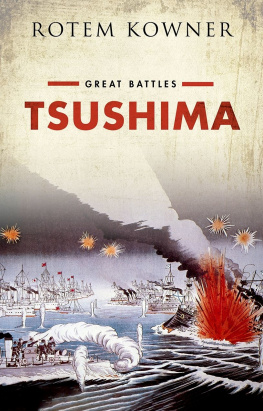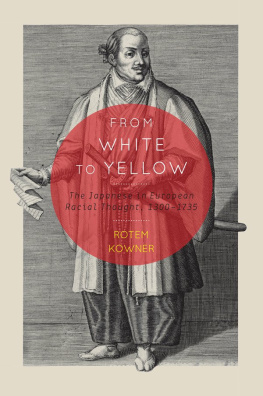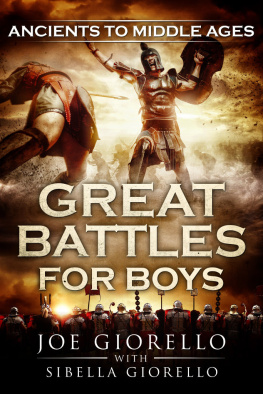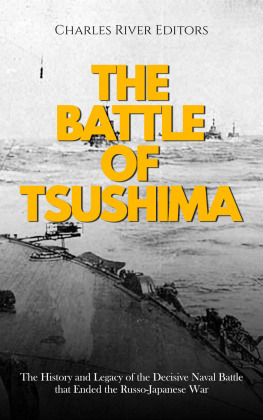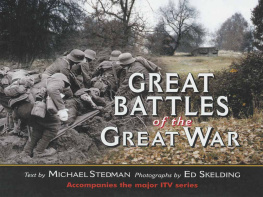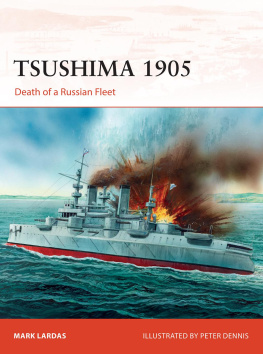Rotem Kowner - Tsushima: Great Battles Series
Here you can read online Rotem Kowner - Tsushima: Great Battles Series full text of the book (entire story) in english for free. Download pdf and epub, get meaning, cover and reviews about this ebook. year: 2022, publisher: Oxford University Press, Incorporated, genre: History. Description of the work, (preface) as well as reviews are available. Best literature library LitArk.com created for fans of good reading and offers a wide selection of genres:
Romance novel
Science fiction
Adventure
Detective
Science
History
Home and family
Prose
Art
Politics
Computer
Non-fiction
Religion
Business
Children
Humor
Choose a favorite category and find really read worthwhile books. Enjoy immersion in the world of imagination, feel the emotions of the characters or learn something new for yourself, make an fascinating discovery.
- Book:Tsushima: Great Battles Series
- Author:
- Publisher:Oxford University Press, Incorporated
- Genre:
- Year:2022
- Rating:4 / 5
- Favourites:Add to favourites
- Your mark:
- 80
- 1
- 2
- 3
- 4
- 5
Tsushima: Great Battles Series: summary, description and annotation
We offer to read an annotation, description, summary or preface (depends on what the author of the book "Tsushima: Great Battles Series" wrote himself). If you haven't found the necessary information about the book — write in the comments, we will try to find it.
Tsushima: Great Battles Series — read online for free the complete book (whole text) full work
Below is the text of the book, divided by pages. System saving the place of the last page read, allows you to conveniently read the book "Tsushima: Great Battles Series" online for free, without having to search again every time where you left off. Put a bookmark, and you can go to the page where you finished reading at any time.
Font size:
Interval:
Bookmark:

Rotem Kowners Tsushima constitutes a tour de force treatment of this epic battle and its multiple legacies. He establishes remote and immediate contexts, provides accurate description and informed analysis, and delves deeply into aftermath.
Bruce W. Menning, Professor of Strategy (ret.), U. S. Army Command and General Staff College
A book of remarkable originality, daring, and openness of mind. Professor Kowner presents a skilful account of Tsushima which for the first time equally embraces Japanese and Russian sides of the battle and its consequences.
Dmitrii V. Likharev, Far Eastern Federal University, Vladivostok, Russia
A penetrating and comprehensive study of the most consequential naval battle fought between Trafalgar (1805) and Pearl Harbor (1941). Where Kowners work shines brightest is his insightful analysis of this battles military, political, and cultural legacy for both participants and the wider world. Tsushima is masterful.
J. Charles Schencking, Author of Making Waves: Politics, Propaganda, and the Emergence of the Imperial Japanese Navy, 18691922
Rotem Kowners Tsushima presents a comprehensive account of the Battle of Tsushima Strait in 1905. It skilfully describes how and why it occurred and ended with a decisive and one-sided victory by the Imperial Japanese Navy. Among other things, this book is about the big battleships and guns. Well prepared and trained, the IJN made the best use of them against the Baltic Fleet and earned well-deserving glory and acclaim. However, the memory of decisive victory at Tsushima also planted in the minds of generations of IJNs leaders hubris, arrogance, and inflexibility to adjust and change IJNs naval doctrine until its last days in 1945. Kowner, as a true historian, re-enacts the days of the big battleships and guns, and beckons us all to return to the seas again.
Naoyuki Agawa, Author of Friendship Across the Seas: The US Navyand the Japan Maritime Self-Defense Force

Great Clarendon Street, Oxford, ox 2 6 dp , United Kingdom
Oxford University Press is a department of the University of Oxford. It furthers the Universitys objective of excellence in research, scholarship, and education by publishing worldwide. Oxford is a registered trade mark of Oxford University Press in the UK and in certain other countries
Rotem Kowner 2022
The moral rights of the author have been asserted
First Edition published in 2022
Impression: 1
All rights reserved. No part of this publication may be reproduced, stored in a retrieval system, or transmitted, in any form or by any means, without the prior permission in writing of Oxford University Press, or as expressly permitted by law, by licence or under terms agreed with the appropriate reprographics rights organization. Enquiries concerning reproduction outside the scope of the above should be sent to the Rights Department, Oxford University Press, at the address above
You must not circulate this work in any other form and you must impose this same condition on any acquirer
Published in the United States of America by Oxford University Press
198 Madison Avenue, New York, NY 10016, United States of America
British Library Cataloguing in Publication Data
Data available
Library of Congress Control Number: 2021946671
ISBN 9780198831075
ebook ISBN 9780192566812
DOI: 10.1093/oso/9780198831075.001.0001
Printed and bound in the UK by Clays Ltd, Elcograf S.p.A.
Links to third party websites are provided by Oxford in good faith and for information only. Oxford disclaims any responsibility for the materials contained in any third party website referenced in this work.
The phrase great battle carries four immediate connotations. The first relates to time. The standard narrative, whether applied to Marathon or Waterloo, Salamis or Trafalgar, assumes that the events occurred on a single day, or at most over two or three days. Secondly, a battle has to be on a scale large enough not to be deemed a skirmish. Fighting may characterise war but fighting itself does not constitute a battle. If the forces involved are too small or the commitment to engage by one or both sides too slight, then what happens is not a great battle. At least one side, and possibly both, must want to fight. Third, a battle occurs in a defined, and in some cases confined, space. On land it is sometimes so geographically limited that it takes its name from an otherwise little-known geographical feature, such as Bunker Hill, or an obscure village or hamlet. At sea, its name may be more capacious but as often it gains precision by adopting the name of the nearest landfall. Lastly, a great battle implies that the consequences are commensurate with the commitment; in other words, that the result proves decisive.
The infrequency with which all these four conditions have been met helps explain why great battles have been rare. Great battles need to be infrequent or they lose their cachet. Calling some forms of combat battles may be no more than a rhetorical device, coined for effect, or, more pragmatically, to give shape to otherwise seemingly inchoate episodes. Since the nineteenth century the word battle has been applied to events that are not concentrated in time and space. Persistent fighting in all seasons and all weathers combined with technological innovation and full social and economic mobilisation to make outcomes more cumulative than singular. In the Second World War, the battle of the Atlantic was decisive, both in the economic war and in enabling the D Day landings, but it was not clearly defined in time or space. It lasted nearly four years and, although largely restricted to the North Atlantic, still embraced an expanse of sea larger than any major continent.
At sea especially, battle in a traditional sense was rarely decisive. As the British seapower theorist, Julian Corbett, observed in 1911, man lives upon the land, and so it scarcely needs saying that it is almost impossible that a war can be decided by naval action alone. The Greeks may have checked the Persians at Salamis in 480 BC but they did not topple the Persian empire. The Christian victory over the Turks at Lepanto in 1571 was similarly a great defensive success, which checked the Ottoman advance into the Mediterranean but not into continental Europe. On 21 October 1805 Nelson decisively defeated the French and Spanish fleets at Trafalgar but war with France continued for another decade. While Nelsons victory gave the Royal Navy command of the Mediterranean and secured British trade routes in the Atlantic, it did not end Napoleons freedom of manoeuvre within Europe. Just over six weeks after Trafalgar, the French emperor won possibly his greatest victory, defeating the armies of Austria and Russia at Austerlitz on 2 December 1805. However, even in land warfare decisiveness can be a relative, rather than an absolute, term. The continental alliance which he had smashed in 1805 was resuscitated in 1813. For many then and since, the final defeat of Napoleon at Waterloo in 1815 embodies the concept of decisiveness, not least because it introduced nearly a century of comparative European peace, but its outcome too rested as much on the exhaustion of France, and of its enemies, after two decades of conflict as it did on the results of a single day on a confined battlefield, however sanguinary the fighting.
Font size:
Interval:
Bookmark:
Similar books «Tsushima: Great Battles Series»
Look at similar books to Tsushima: Great Battles Series. We have selected literature similar in name and meaning in the hope of providing readers with more options to find new, interesting, not yet read works.
Discussion, reviews of the book Tsushima: Great Battles Series and just readers' own opinions. Leave your comments, write what you think about the work, its meaning or the main characters. Specify what exactly you liked and what you didn't like, and why you think so.

